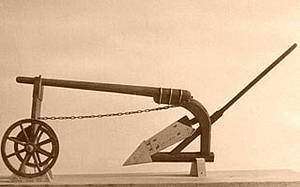Von Thuenen as an agriculturalist
Von Thuenen very early in his life decided to become an agriculturalist. After being trained by Lucas Andreas Staudinger in Flottbeck near Hamburg, he attended courses from Albrecht Daniel Thaer, one of the most important agricultural researchers of his time.
He was forced to abandon his first land lease near Anklam after a short while. Searching for a long time, in 1810 he finally decided to buy the manor Tellow near Teterow.
Introducing more effective methods of cultivation and enhancing the soil, he managed to increase his yields significantly. He heavily relied on his accurate perception of nature, his agricultural experiments and his detailled bookkeeping in Tellow, where he diligently registered every bit of information regarding his manorial economy.
He spread his experience in a multitude of publications in the annals of the mecklenburg patriotic union.
Alongside this article, you can see the so called "Hakenpflug" developed by von Thuenen and being successfully used in Tellow. It combined both the advantages of the mecklenburg farm-hook with these of a plow. Its usage, however, required a certain dexterity skill.
Questions of soil fertility lay in von Thuenens special Interest (Bodenstatik). Apart from the theoretical exchanges of ideas he had with some of his most renowned contemporaries like Carl von Wulfen and Caspar von Voght, he, on a functional side, introduced new ways of economic procedures together with his manor neighbour Carl Pogge and the sons of him.It is rooted in von Thuenens strong conviction to cultivate the soil in a sustainable and ressource-conserving way that Tellow developed into a advanced model manor. This success also turned von Thuenen into a well appreciated advisor for questions of agriculture thoughout the country.
|
| ||
„Husbandry ought to be perceived as a machine, transforming the humus of earths soil into grain and on the farmers potency it relies, wheather this metamorphosis will occur in a larger or in a lesser extend, therefore, to yield a larger or a lesser quality in grain."Johann Heinrich von Thünen, IS 2. T. 2. Abt. S. 228f | |||
|
